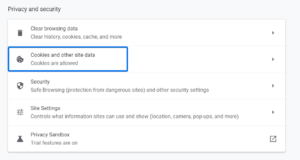How to Allow Third Party Cookies on Your Website
If you are considering allowing third-party cookies on your website, it’s important to know what they are and why you should allow them. You also need to know how to remove or block them and what the requirements are for consent. Here’s a handy guide to help you understand your options.
There are a number of benefits to accepting third-party cookies, from the convenience of pre-filled address information to personalized content. You may want to consider whether this is right for you. However, it is important to remember that these cookies are not all created equal. For instance, Facebook may track the information you enter on its website. This can be dangerous as you will have no control over this information. In addition, cookies can slow down your computer as new ones are stored on your hard drive. You should always check with your antivirus software before accepting any cookies from websites Google.

If you want to use third-party cookies, you should know what they are and how they work. This technology helps online marketers track you and target ads based on your interests. One of the largest online advertising firms, Google, uses third-party cookies to track your browsing habits and create ads that are more relevant to you.
How To Blocking Or Removing Them:
Blocking or removing third party cookies can help protect your privacy and make your online experiences more enjoyable. Third party cookies are primarily used to track users and serve them targeted advertisements. Although these cookies are not harmful per se, they are generally considered to be privacy invasions. They do not affect the core functionality of your website, but they are useful to marketers. These cookies enable websites to target advertisements based on user interests and habits.
You can choose to block or remove third-party cookies on your computer by using your browser’s settings. Third-party cookies are created by websites other than the one you are currently visiting. They are used to track your web browsing habits and preferences, and they are considered a privacy violation. Most web browsers automatically allow third-party cookies, but you can disable them in your browser.
Why You Should Accept Third-Party Cookies:
Third-party cookies are generated when you request a third-party service on a website. They are typically run through JavaScript or other programming languages.

Consent is a legal requirement when websites set cookies. It can be voluntary or explicit and is obtained in a number of ways. Typically, consent is obtained by presenting users with a cookie banner, which gives users the choice to accept or decline cookies, as well as their cookie preferences.
How To Requirements For Consent:
To meet GDPR requirements, websites must provide a clear, unambiguous consent process to users. This requires clear and conspicuous language and is easy to understand. The consent process should be as simple as possible, with clear links to related cookie policies and concise explanations of the purposes of the cookies.
In addition to asking consumers to opt-in, businesses must ensure that they have a simple way for them to withdraw consent at any time. The ePrivacy Directive and GDPR also require that sites give users a simple way to withdraw consent. Many industry organizations have taken steps to comply with these requirements. For example, the Interactive Advertising Bureau Europe’s Transparency and Consent Framework aims to standardize how businesses disclose personal data and ensure compliance with GDPR.
How To Ways To Enable Them:
Some websites may have a problem allowing you to log into their services, so enabling third party cookies may help you solve that problem. You can do this through your browser settings. To do so, select the three-dot menu on the top-right corner of your web browser and choose Settings. From there, choose Privacy and security and check the box next to Allow all cookies and site data.
Some browsers, such as Safari, block third-party cookies by default. However, if you prefer to use these cookies, you can disable this setting by turning off the option under your web browser’s preferences. You can also use extensions to protect your privacy. These extensions will help you manage which websites can and cannot set cookies.
Chrome On Android:
- Tap the three vertical dots in the upper right corner of Chrome and select Settings.
- Find the Advanced section and go to Site Settings.
- In the site settings, click on cookies and check the “Allow third-party cookies” box.
- Close and reload your browser.
Besides helping you improve your browsing experience, cookies also help you see the ads that are most relevant to you. Third-party cookies help advertisers target users with advertisements based on their interests. They are used to measure traffic and make online ads more personalized to you.

Leave a Reply